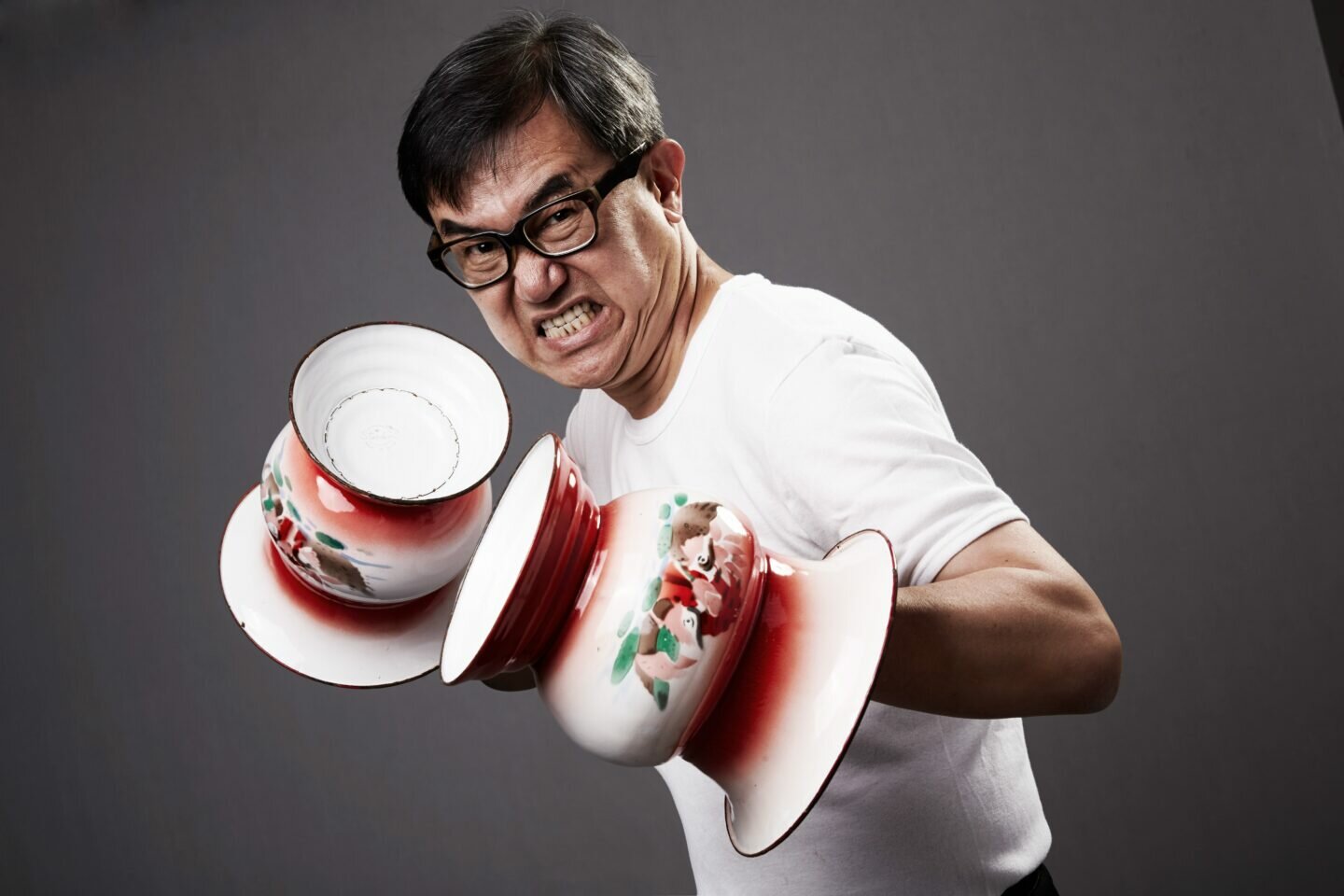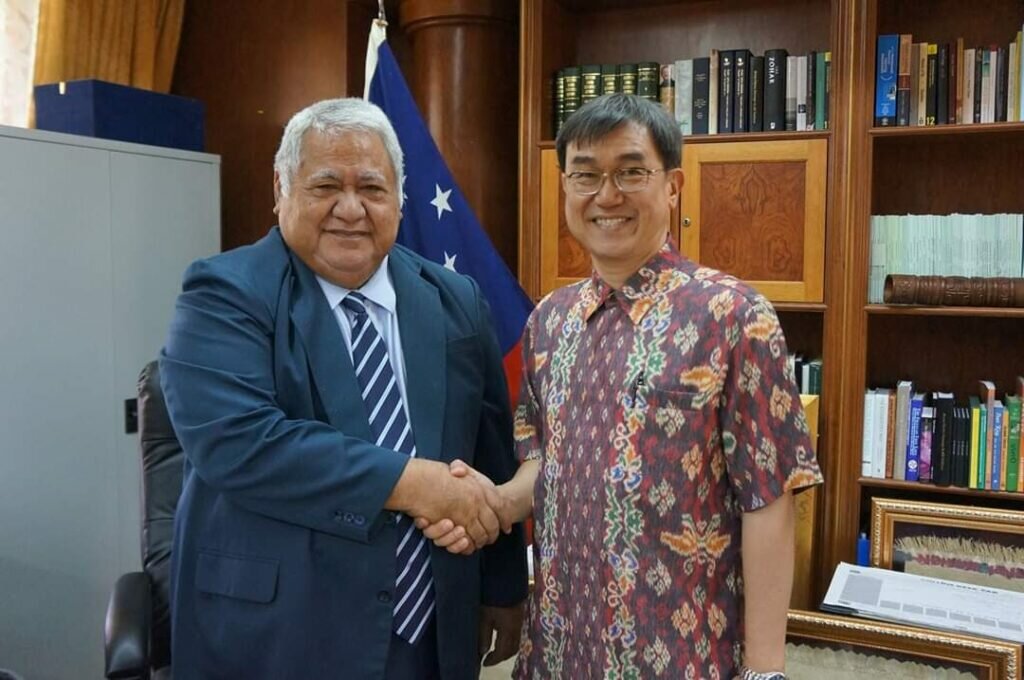It can be difficult to separate Jack Sim from his zany public persona. Between his scatological humour – just watch him unleash a relentless torrent of cringey puns onto his gleeful TedX audience without skipping a beat – and turns as a costumed superhero fighting poor sanitation, the self-made millionaire plays the part of a moneyed eccentric with brio.
At first blush, the stereotype he invokes isn’t far off the mark. Pottering about his rambling heritage bungalow in Meyer Road, the property developer turned social activist reveals himself to be something of a dilettante, with an art collection not limited to a self-portrait resembling Buddha.
The intricate line drawing, he tells me distractedly over trilling birdsong routinely broken by the predatory roar of construction, depicts themes from sex to nature and imprisonment. I ask him about the Lee Kuan Yew busts lining his living room and pool, which he designed for donors of the World Toilet Organization (WTO).
“Lee Kuan Yew set the structure and momentum for a prosperous Singapore. It’s not that we are PAP followers, but the history of the country is quite related to his work,” he muses in his idiosyncratic lilt.
He Now Runs A Social Enterprise
Creative diversions aside, you can’t accuse Sim of navel-gazing. Today, the grizzled 64-year-old appears to be in a pensive, rather than puckish mood, having turned his attentions to the Sisyphean task of obviating poverty through his social enterprise accelerator Base of Pyramid (BoP).
“It is quite ridiculous that the world has nearly eight billion people, of which four billion exist outside our formal economy and earn less than US$5.50 a day. A billion don’t have electricity, two billion lack access to toilets and 700 million don’t have clean drinking water. So there’s a lot of deprivation and what causes this is a lack of access to opportunity, investment, networking, technology and training,” he explains.
Poverty, the philanthropist posits, is a pathology caused by market and governmental failure. “A lot of philanthropists think that it is enough to give some money to build schools without funding the teachers, and these usually wind up empty. Likewise, you must create a business model that is continuous; when I look at Singapore transforming from a third- to first-world country, it was always through market efficiency,” he asserts.
-
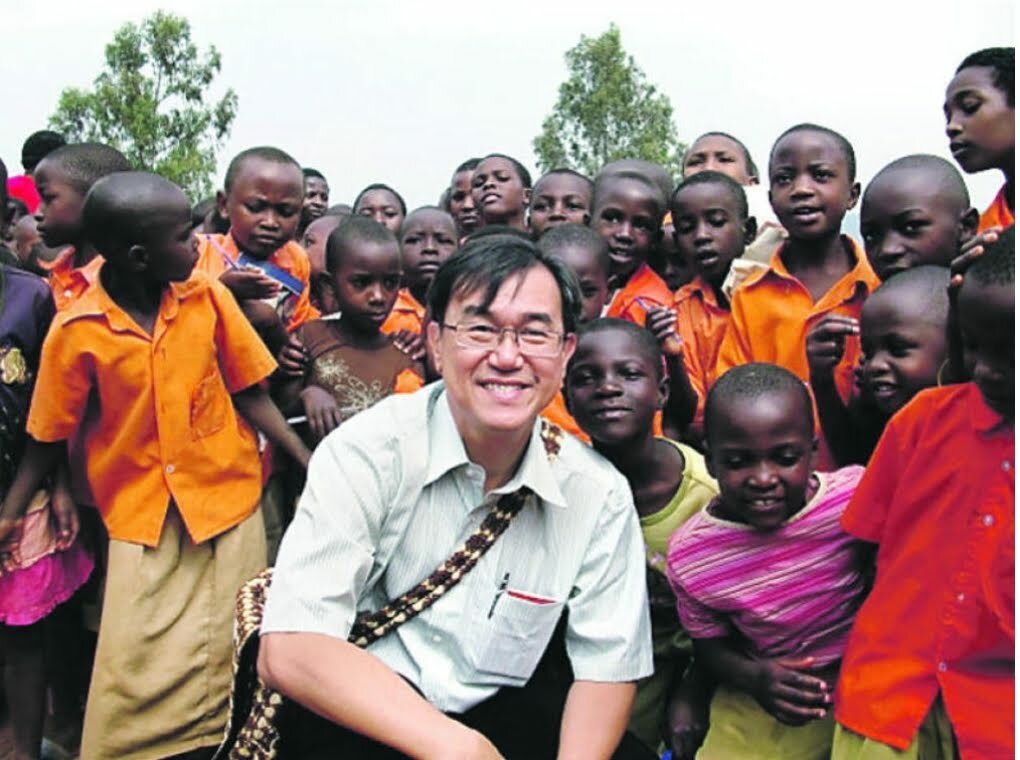
Jack Sim, the founder of Base of Pyramid (BoP) -
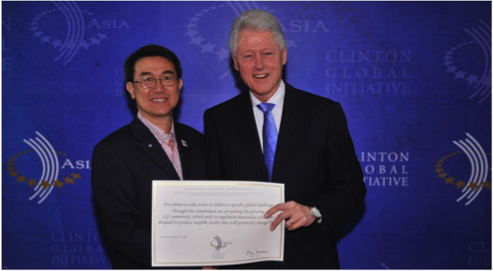
Jack Sim, the founder of Base of Pyramid (BoP), with Bill Clinton
To that end, Sim this year established the 65,000 sq ft headquarters of BoP, despite grappling with a series of obstacles including ratcheting building costs. Sim says he funded the building, which he leases out to other tenants, with S$2 million out of his own pocket and an eye-watering S$8 million bank loan.
Ten years in the making, the BoP hub arose from an encounter between Sim and former US president Bill Clinton. “He invited me to make a commitment to do something big, and I thought building a World Trade Centre for the poor would be useful.” Since 2011, BoP has worked with international non-profits such as Ashoka and Schwab Foundation for Social Entrepreneurship to identify and scale promising social enterprises, for a fee.
On its agenda, is a project to bring skilled construction labourers from Bangladesh to Singapore through a Bangladesh-based NGO. While migrant worker welfare issues in Singapore can be an albatross uneasily acknowledged whenever negative media coverage resurfaces, Sim contends that having fewer but more highly skilled workers in the country can ensure equitable salaries and living standards. “We live in the first world and the construction worker lives in feudalism; I don’t think that’s fair,” he flatly states.
A Sanitation Champion
The entrepreneur clearly isn’t loath to broaching uncomfortable subjects. He founded WTO to champion modern sanitation in marginalised communities globally, an issue he says lacked funding due to its unsavoury nature. This year marks the organisation’s 20th anniversary, which he’s commemorating with a tome featuring a tribute by veteran diplomat Tommy Koh lionising him as a “treasure of Singapore and the world”.
The sad part is that prophets are always not welcome at home.
Jack Sim
The ambassador-at-large played no small part in influencing the United Nations to designate Nov 19 as World Toilet Day in 2013. It’s a movement that’s sprung its own life, earning the endorsement of world leaders including Chinese president Xi Jinping and Indian prime minister Narendra Modi, and promulgated by a refulgence of stars such as Matt Damon and Jay Z.
By the same token of his international cachet, Sim shares that his efforts haven’t been met with equal enthusiasm in Singapore. While a registered charity, WTO isn’t recognised as an Institution of a Public Character (IPC), as most of its work is conducted overseas. Thus, it does not enjoy the 250 per cent tax relief accorded to such organisations. “The sad part is that prophets are always not welcome at home,” muses the man who has earned himself the sobriquet, Mr Toilet. His frustration with local bureaucracy is palpable in Mr. Toilet: The World’s #2 Man, the 2019 film documenting his triumphs and travails as an activist.
Sim shares that he’s been working for free for the past 24 years. His secret to lending credence to the cause, Sim tells me, lies in guerilla marketing. The tactic shimmies in step with Richard Branson’s cross-dressing publicity stunts, and has an indelible quality. Indeed, a clip of Sim blithely mooting toilet talk with Caucasian tourists over lunch – their strained smiles stretched over gritted teeth – is inexplicably seared into my memory.
“If I didn’t add humour to this very unpalatable subject called sh*t, then it would have been difficult to change the narrative. What happened was that after the media gave legitimacy to sanitation, politicians realised that they too could gain exposure if they promised to build toilets,” he explains.
While Sim’s irreverence flies in the face of stuffy conventional advocacy discourse, it underscores an issue of exigency. The World Health Organization reported that some 827,000 people in low- and middle-income countries die as a result of inadequate water, sanitation and hygiene each year.
Let the rich challenge each other based on the societal impact they create and redefine a billionaire as someone who has improved the lives of a billion people. I think fashion can change the world faster than policies.
Jack Sim
For Sim, the iniquities encountered by women who lack proper sanitation facilities, including sexual assault, beggar belief. “Social justice is important to me, as I grew up in a generation where we watched Teochew opera, which distinguishes right from wrong. Young people today get their lessons from Squid Game,” he says.
Not that his messaging is imbued with the same pathos as Chinese opera. The inveterate jokester offers that he plans to walk around in a T-shirt with a posterior printed on its back to gain attention on social media. “You create this quirky persona where at first people laugh at you and regard you as a clown, but it doesn’t matter because it really isn’t about me but creating a ripple effect. When you view yourself as unimportant, your ability to tell a story becomes very wide-ranging,” he shares.
If anything, the father-of-four grown children’s larky, unorthodox brand of activism is worthy fodder for mainstream entertainment. Sim shares that there’s an eight-episode Netflix series chronicling his colourful life in the works.
Redefining Wealth
But what can be dismissed as parlour tricks may well be a foil for a philosophical bent. Much has been written about how the O-level failure relinquished a successful business to pursue social work while in the throes of a midlife crisis, but Sim is surprisingly unsentimental about his move. “When you don’t need more money you are selling time, which is more precious, and that is a loss-making business,” he reasons.
-
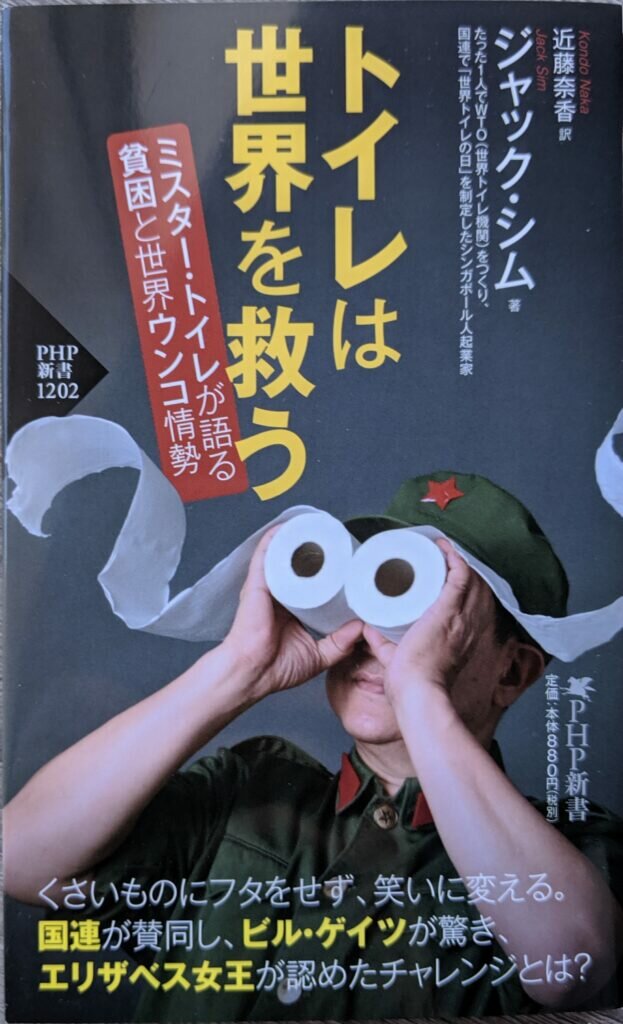
Jack Sim, the founder of Base of Pyramid (BoP) -
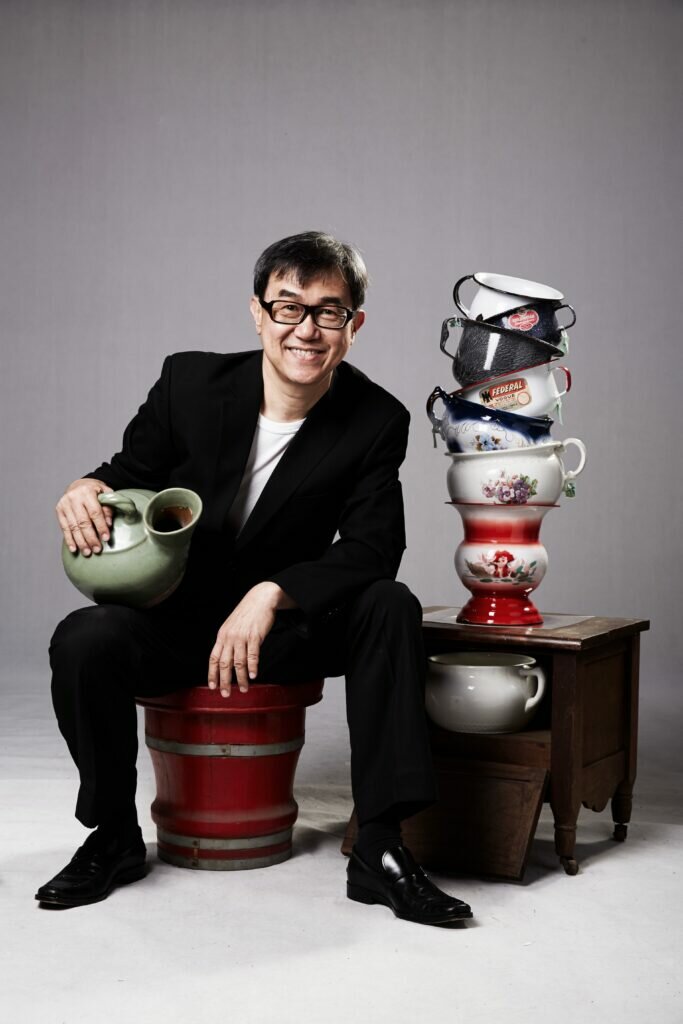
Jack Sim, the founder of Base of Pyramid (BoP)Jim Orca
The public speaker is currently penning the script for a movie premised on the concept of a societal taxation system. It’s a fitting theme, in view of a pandemic that has exacerbated inequality, and growing calls for a wealth tax. So, are we due for a collective reset?
“We are so crazy trying to make more money we don’t need to impress the people we don’t like. One way to lower the Gini coefficient in Singapore is to make philanthropy a status symbol. Let the rich challenge each other based on the societal impact they create and redefine a billionaire as someone who has improved the lives of a billion people. I think fashion can change the world faster than policies,” he concludes.
